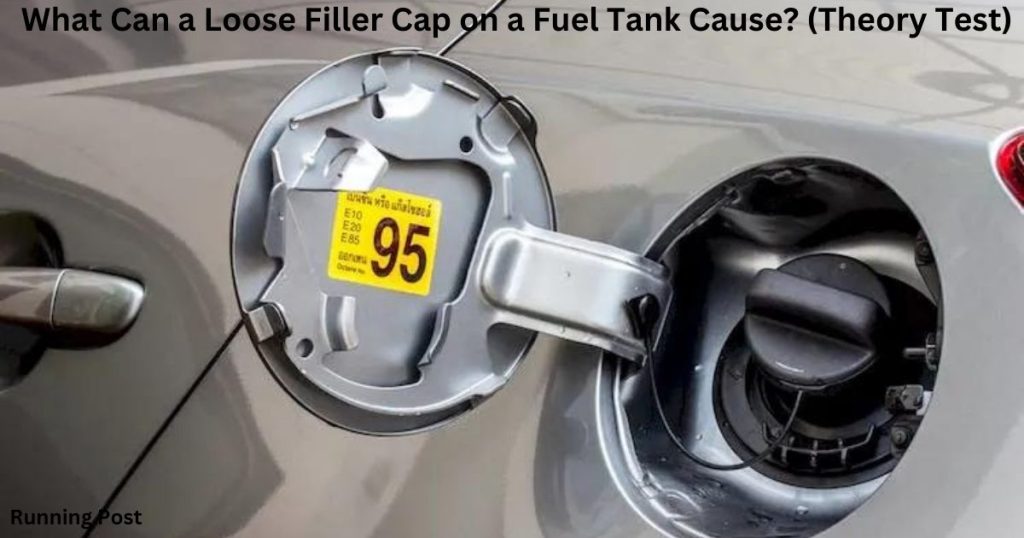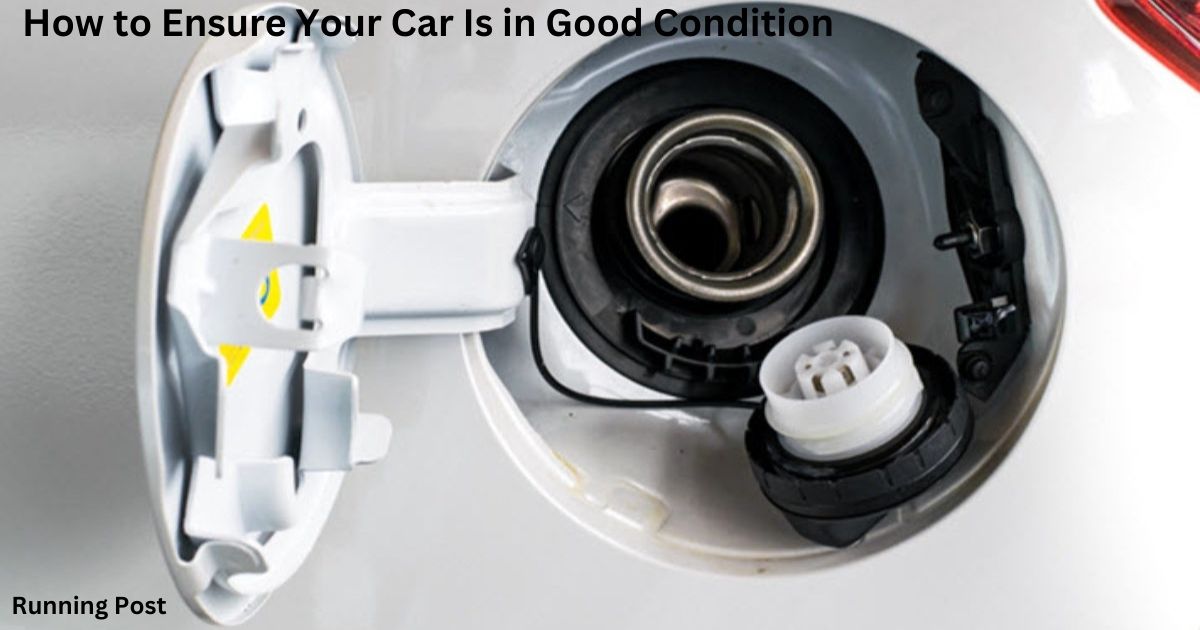| A: It can make the engine difficult to start | B: It can make the roads slippery for other road users | C: It can improve your vehicle’s fuel consumption | D: It can increase the level of exhaust emissions |
Understand The What Can a Loose Filler Cap on Your Diesel Fuel Tank Cause?
A loose filler cap on your diesel fuel tank might seem like a minor issue, but it can have significant consequences. When the cap isn’t properly secured, diesel fuel can spill, creating hazardous conditions on the road. This spillage can make the surface slippery, posing a risk to all road users. Additionally, the potential for diesel fumes to enter the vehicle cabin can cause discomfort and health issues for passengers and drivers alike.
The Impact of a Loose Filler Cap on Road Safety
Diesel Spillage and Slippery Roads
One of the most immediate impacts of a loose filler cap is the potential for diesel spillage. When diesel leaks onto the road, it can create a slippery surface that increases the risk of skidding and accidents. This is particularly dangerous in wet conditions or on inclines, where the risk of losing control is already heightened. Drivers should be especially cautious if they notice any signs of spillage, as it can drastically affect traction and stability.
How Diesel Fuel Can Endanger Other Road Users
Spilled diesel fuel not only affects the vehicle leaking it but also endangers other road users. Motorcyclists and cyclists are particularly vulnerable, as they can easily lose control on a slippery surface. Even cars and trucks can struggle to maintain grip, leading to potential collisions. It’s crucial for drivers to address any issues with their fuel cap promptly to ensure the safety of everyone on the road.
Risks to Motorcyclists and Cyclists
Motorcyclists and cyclists are at a higher risk of accidents caused by slippery road conditions due to their smaller contact patches and less stability compared to cars. Diesel spillage can cause sudden and unexpected loss of traction, leading to falls and crashes. As such, it’s important for all drivers to be aware of the risks and to address any leaks or spillage immediately to prevent accidents.
Environmental Consequences of Diesel Leaks
Fuel Contamination of Soil and Water
Diesel spills from a loose filler cap can also have detrimental environmental effects. Diesel fuel is a pollutant that can contaminate soil and waterways, harming plant and animal life. When fuel leaks onto the ground, it can seep into the soil, potentially reaching groundwater sources. This contamination can have long-term effects on the ecosystem, making it essential to handle diesel leaks promptly.
The Effect on Air Quality
In addition to soil and water contamination, diesel fumes released from a loose cap can degrade air quality. Diesel vapors contain harmful compounds that can contribute to air pollution and health problems. Prolonged exposure to these fumes can lead to respiratory issues and other health concerns for individuals in the vicinity. Ensuring that the fuel cap is secure can help mitigate these environmental and health impacts.
What Can a Loose Filler Cap on a Fuel Tank Cause? (Theory Test)

In a theory test, understanding the implications of a loose filler cap is crucial. It’s a common question that tests your knowledge of vehicle maintenance and road safety. Here’s what you need to know:
Common Theory Test Questions About Fuel Cap Issues
What You Need to Know for the Theory Test
Theory tests often include questions about vehicle maintenance and safety practices. A loose filler cap is a typical subject, and it’s important to know the potential consequences. The test might ask about the risks associated with a loose cap, such as spillage, environmental damage, and safety hazards. Familiarizing yourself with these issues will help you answer questions accurately.
The Correct Answer: Why a Loose Filler Cap Matters in Real Life
The correct answer to questions about a loose filler cap generally highlights the risks of spillage and its effects on road safety and the environment. Understanding that a loose cap can lead to slippery roads, pollution, and potential vehicle issues will ensure you provide a comprehensive and accurate response in the theory test.
What Happens If the Fuel Cap Is Loose?
A loose fuel cap can lead to several issues, ranging from immediate safety concerns to longer-term vehicle performance problems. Here’s a closer look at what happens when the fuel cap is not properly secured:
Potential Issues With a Loose Fuel Cap
Diesel Smell and Fumes Entering the Vehicle
When the fuel cap is loose, diesel fumes can escape and enter the vehicle cabin. This can cause a noticeable diesel smell inside the car, which is unpleasant and can lead to discomfort for passengers. Prolonged exposure to these fumes can also have health implications, including respiratory problems. Addressing a loose cap promptly helps prevent these issues and keeps the cabin environment safe and comfortable.
Loss of Fuel Efficiency and Increased Consumption
A loose cap can also affect fuel efficiency. When the cap isn’t sealed correctly, it can cause the fuel to evaporate more quickly, leading to increased fuel consumption. This not only affects your wallet but can also lead to decreased overall vehicle performance. Ensuring that the filler cap is tight helps maintain optimal fuel efficiency and reduces unnecessary fuel loss.
Check Engine Light Activation
Another issue related to a loose fuel cap is the activation of the check engine light. Modern vehicles use sensors to detect issues with the fuel system, including problems with the cap. A loose or missing cap can trigger the check engine light, indicating a potential problem. While this may not always indicate a severe issue, it’s important to address it to avoid further complications.
You Also Like It:
How will a roof rack affect your car’s performance?
What’s the legal minimum depth of tread for car tyres?
Which vehicles are prohibited from using the motorway?
Mechanical and Maintenance Problems
How a Loose Cap Can Cause Pressure Issues in the Fuel System
A loose filler cap can disrupt the pressure balance within the fuel system. Diesel engines rely on a controlled pressure environment for optimal performance. When the cap is loose, it can cause fluctuations in pressure, potentially leading to issues such as reduced engine efficiency or difficulty starting. Regularly checking and securing the fuel cap helps maintain proper system pressure and ensures smooth engine operation.
Potential Engine Performance Problems
In addition to pressure issues, a loose fuel cap can contribute to broader engine performance problems. For example, inconsistent fuel delivery or increased vaporization can affect engine power and responsiveness. Addressing a loose cap promptly can prevent these performance issues and ensure that your vehicle runs smoothly.
What Should You Do If You’ve Lost the Filler Cap for Your Diesel Tank?
If you’ve lost the filler cap for your diesel tank, it’s important to take immediate action to prevent potential issues. Here’s what you should do:
Immediate Steps to Take
Securing the Fuel Tank Temporarily
Until you can replace the missing cap, it’s crucial to secure the fuel tank to prevent contamination and spillage. You can use temporary solutions like covering the opening with a clean cloth or plastic wrap to minimize the risk of debris entering the tank. This makeshift solution can help protect your fuel system until you get a permanent replacement.
Using an Emergency Replacement Filler Cap
If you need a temporary fix, you can purchase an emergency replacement filler cap from an auto parts store. These universal caps are designed to fit a variety of vehicles and can serve as a stopgap measure until you can obtain the correct cap for your diesel tank. Make sure to choose a cap that fits securely to prevent further issues.
How to Get a Permanent Replacement
Contacting Your Vehicle Manufacturer or Dealership
For a permanent replacement, the best course of action is to contact your vehicle manufacturer or dealership. They can provide the exact filler cap designed for your vehicle’s make and model, ensuring a proper fit and function. This approach ensures that you get a high-quality replacement that meets your vehicle’s specifications.
Buying a Universal Replacement Diesel Filler Cap
Alternatively, you can purchase a universal replacement diesel filler cap from an auto parts retailer. While these caps can serve as a temporary solution, it’s important to verify that they are compatible with your vehicle. A universal cap should fit securely and effectively seal the tank to prevent spillage and contamination.
You Also Like It:
Why have ‘red routes’ been introduced in major cities?
Releated Posts
MAB Instructor Certification: Your Gateway to Professional Crisis Management Leadership
In today’s fast-evolving professional environments—especially in healthcare, mental health, education, and corrections—conflict and aggression can arise without warning.…
Freewayget.com: Your Ultimate Platform for Deals, Discounts, and Digital Products
Introduction to Freewayget.com In today’s fast-paced digital world, finding reliable platforms that offer authentic discounts, deals, and digital…
Affordable & Fast Embroidery Digitizing Services in Your Area
Embroidery digitizing services provide corporations, designers, and people with brilliant embroidery-equipped designs by means of changing art work…
Introduction to hdhub4u nit
In this article, we will delve into the details of hdhub4u nit, exploring its features, benefits, and why…

















